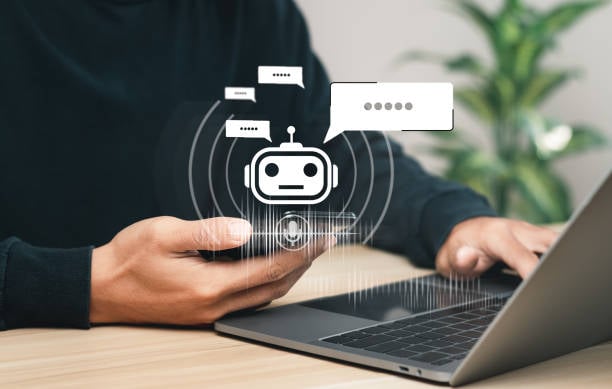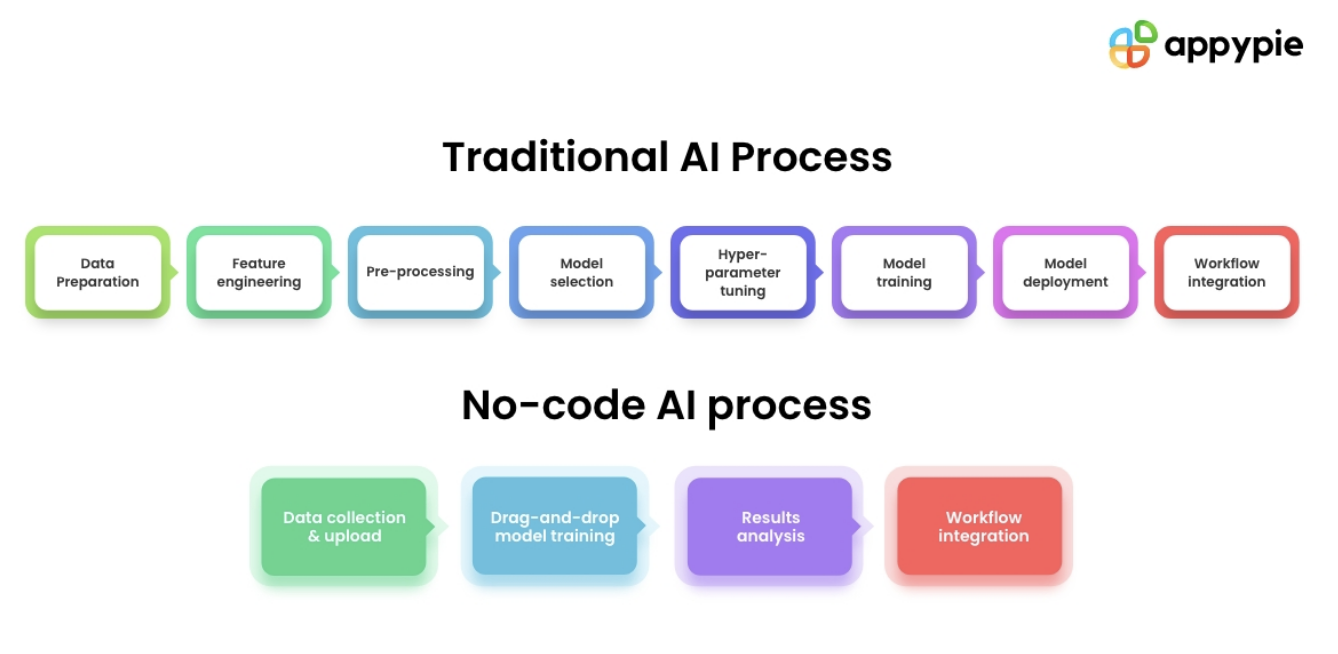May 5, 2023
 by Abhinav Girdhar / May 5, 2023
by Abhinav Girdhar / May 5, 2023

The rise of no-code development ushered in a new era in software development.
Coupled with artificial intelligence (AI), no-code AI is changing the game yet again. You no longer need to be a technical expert to create and launch products that were once out of reach.
No-code AI enables you to automate complex processes and generate designs, features, and even entire applications without having to code. It's critical not only for users with limited technical know-how but also for developers, saving them time spent on writing heavy lines of code that could be better spent innovating.
No-code AI puts mundane tasks on autopilot, taking the grunt work out of the picture and empowering you to bring new ideas to life.
No-code AI is a novel approach to artificial intelligence that empowers individuals with limited or no coding expertise to develop and deploy AI models.
Its design simplifies and streamlines creating and deploying AI-powered applications, making them accessible to a broader range of users. No-code AI uses graphical user interfaces (GUIs) and pre-built machine learning models to build AI-based applications.
AI lets users input data, configure the model, and quickly create intelligent applications without coding expertise. It's one of the most efficient ways to develop and deploy AI applications faster.
No-code AI is a more accessible path to AI development without hiring data scientists or software developers.

Source: Appy Pie
Using no-code development platforms, users can experiment with different AI models and apply them to specific use cases without extensive technical or programming skills. This makes it easier than ever to develop an AI application tailored to your business needs, regardless of your technical background.
For example, healthcare providers can use no-code AI to analyze patient data and make more informed decisions about treatment plans. At the same time, e-commerce companies can personalize product recommendations and improve the customer experience.
This democratization of AI enables business leaders to own their AI projects and develop innovative solutions. It has the potential to transform the way companies operate and will play a significant role in shaping the future of AI app development.
No-code AI is an amalgamation of several emerging technologies.
With its ability to automate repetitive tasks and streamline processes, no-code AI finds many use cases.
Workflow automation software and technology streamline and automate business processes. Automating repetitive tasks improves productivity, efficiency, and accuracy.
Machine learning algorithms in no-code AI can be used to classify documents or analyze customer data, so you can automate data entry and document processing.
Another way to use AI in workflow automation is through chatbots and virtual assistants. Chatbots automate customer service tasks like answering frequently asked questions (FAQs), while virtual assistants automate administrative tasks like scheduling appointments.
When combined with the power of AI, workflow automation can offer even greater benefits, offering businesses a range of innovative tools to streamline their operations and improve their bottom line.
With no-code AI, it's now possible to create realistic images. From video game development to product design and advertising, AI-generated images can be used in various fields.
Here are some of the benefits of using AI for image generation:
While no-code AI has seen a notable surge in popularity, some challenges remain to be addressed.
As no-code AI continues to grow, it's worth keeping an eye on a few trends. Here are some possible developments in this area.
Integrating no-code AI into cloud platforms such as AWS, Google Cloud, and Azure will enable companies to develop and deploy AI solutions at scale. Cloud platforms offer a cost-effective way to manage large amounts of data and process complex algorithms, so companies can easily use no-code AI.
AI-powered components like chatbots, image recognition, and speech-to-text are already available in many no-code app development platforms. In the future, we can expect the emergence of more AI-powered components that will make it easier for companies to build more complex applications with less coding.
No-code AI allows organizations to analyze data in real time, identify trends and insights, and make data-driven decisions. This could be particularly beneficial for companies that rely heavily on data to run their businesses.
Hyper automation automates as many tasks as possible in an organization using technologies such as AI, machine learning, and robotic process automation (RPA). No-code AI will play a critical role in hyper automation, enabling organizations to rapidly develop and deploy AI-driven automation solutions without the need for specialized technical expertise.
No-code AI will level the playing field for small and medium-sized businesses by enabling them to use AI-driven solutions without requiring specific technical expertise. As the tech becomes more accessible and affordable, adoption among SMBs will likely increase.
As no-code AI technology evolves, you can expect new use cases in industries like healthcare, finance, and retail. For example, no-code AI could automate medical diagnostics, financial analysis, and personalized shopping experiences.
The integration of new technologies such as NLP, computer vision, and GANs will lead to more advanced and efficient AI solutions capable of handling complex tasks.
Rather than replacing human labor, AI will augment human capabilities and allow them to focus on more complex tasks, leading to increased human-machine collaboration.
As no-code AI becomes more prevalent, it becomes increasingly important to ensure that AI is developed and used ethically and responsibly to promote transparency, fairness, and accountability.
No-code AI will continue to play a major role in various industries. While some might argue that this technology is still in its infancy, its rapid rise indicates its potential to revolutionize the way we work and live. However, with great power comes great responsibility, and the ethical concerns surrounding no-code AI cannot be ignored.
To address these ethical challenges, developers and no-code AI users must prioritize transparency, accountability, and inclusivity. This means ensuring that the datasets used to train AI models are diverse and representative of the population and that the AI model decision-making process is clear and understandable. Additionally, regulations and policies should be implemented to ensure that no-code AI is used ethically and for the benefit of society.
Despite these challenges, the potential benefits of no-code AI in app development, workflow automation, and image generation are enormous. By making AI more accessible and user-friendly, no-code AI has the potential to increase productivity, efficiency, and innovation across multiple industries. As long as we remain vigilant and responsible in using this technology, it can bring positive change.
Should you use low-code or no-code development? Decode the low-code vs. no-code debate and find out what development type best suits your business.
Founder and CEO of Appy Pie, Abhinav Girdhar has 12+ years of experience in the world of technological development and entrepreneurship. His areas of expertise are SEO, app trends, and innovations in AI and ML. He has a passion for fitness and gets his endorphin rush from a run and a strenuous gym session.
Low-code and no-code technology enable businesses to meet the ever-increasing software demand,...
 by Mika Vice
by Mika Vice
You might find a lot of solutions that allow you to carry out complex tasks without coding.
 by Vikas Nangia
by Vikas Nangia
Advancing technology and growing competition are in their heyday.
 by Dinesh Varadharajan
by Dinesh Varadharajan
Low-code and no-code technology enable businesses to meet the ever-increasing software demand,...
 by Mika Vice
by Mika Vice
You might find a lot of solutions that allow you to carry out complex tasks without coding.
 by Vikas Nangia
by Vikas Nangia


